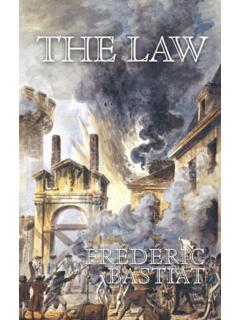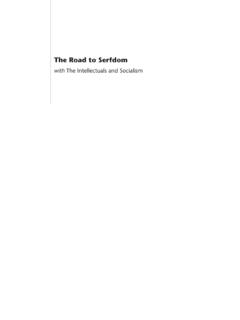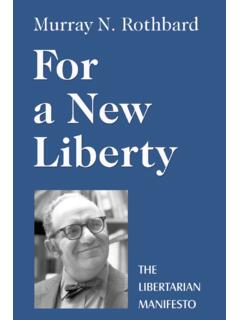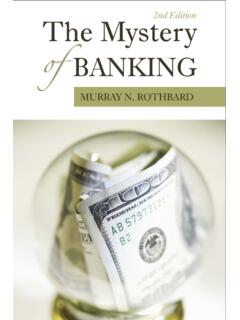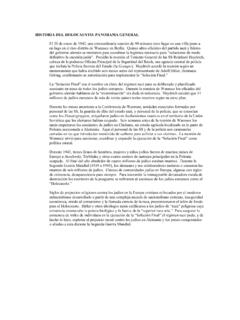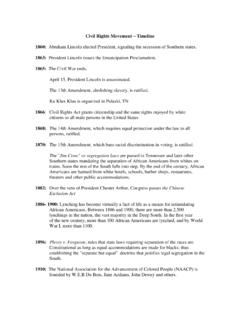Transcription of Anatomy of the State - Mises Institute
1 ANATOMYOF THE STATEANATOMYOF THE STATEMURRAY N. ROTHBARD 2009 by the Ludwig von Mises Institute and published under the Creative Commons Attribution License von Mises Institute518 West Magnolia AvenueAuburn, Alabama : 978-1-933550-48-0 The greatest danger to the State is independent intellectual N. RothbardCONTENTSWhat the State Is Not .. 9 What the State Is .. 13 How the State Preserves Itself .. 18 How the State Transcends Its Limits .. 30 What the State Fears .. 44 How States Relate to One Another .. 47 History as a Race Between State Power and Social Power.
2 53 Index .. 567 WHAT THE State IS NOT The State is almost universally consid-ered an institution of social service. Some theorists venerate the State as the apotheosis of society; oth-ers regard it as an amiable, though often inefficient, organization for achieving social ends; but almost all regard it as a necessary means for achieving the goals of mankind, a means to be ranged against the pri-vate sector and often winning in this compe-tition of resources. With the rise of democracy, the identification of the State with society has been redoubled, until it is common to hear sen-timents expressed which violate virtually every tenet of reason and common sense such as, we Originally published in Egalitarianism as a Revolt Against Nature and Other Essays by Murray N.
3 Rothbard (Auburn, Ala.: Mises Institute , 2000 [1974]), pp. 55 88. 910 Anatomy OF THE STATEare the government. The useful collective term we has enabled an ideological camouflage to be thrown over the reality of political life. If we are the government, then anything a govern-ment does to an individual is not only just and untyrannical but also voluntary on the part of the individual concerned. If the government has incurred a huge public debt which must be paid by taxing one group for the benefit of another, this reality of burden is obscured by saying that we owe it to ourselves ; if the gov-ernment conscripts a man, or throws him into jail for dissident opinion, then he is doing it to himself and, therefore, nothing untoward has occurred.
4 Under this reasoning, any Jews murdered by the nazi government were not murdered; instead, they must have commit-ted suicide, since they were the government (which was democratically chosen), and, there-fore, anything the government did to them was voluntary on their part. One would not think it necessary to belabor this point, and yet the overwhelming bulk of the people hold this fal-lacy to a greater or lesser degree. We must, therefore, emphasize that we are not the government; the government is not us. The government does not in any accurate sense represent the majority of the But, even 1 We cannot, in this chapter, develop the many problems and fallacies of democracy.
5 Suffice it to say here that an individual s if it did, even if 70 percent of the people decided to murder the remaining 30 percent, this would still be murder and would not be voluntary sui-cide on the part of the slaughtered No organicist metaphor, no irrelevant bromide that we are all part of one another, must be permit-ted to obscure this basic fact. If, then, the State is not us, if it is not the human family getting together to decide mutual problems, if it is not a lodge meeting or coun-try club, what is it? Briefly, the State is that orga-nization in society which attempts to maintain a monopoly of the use of force and violence in a given territorial area; in particular, it is the only organization in society that obtains its revenue not by voluntary contribution or payment for services rendered but by coercion.
6 While other individuals or institutions obtain their income by production of goods and services and by the peaceful and voluntary sale of these goods true agent or representative is always subject to that individu-al s orders, can be dismissed at any time and cannot act contrary to the interests or wishes of his principal. Clearly, the represen-tative in a democracy can never fulfill such agency functions, the only ones consonant with a libertarian Social democrats often retort that democracy majority choice of rulers logically implies that the majority must leave certain freedoms to the minority, for the minority might one day become the majority.
7 Apart from other flaws, this argu-ment obviously does not hold where the minority cannot become the majority, for example, when the minority is of a different racial or ethnic group from the OF THE State 1112 Anatomy OF THE STATEand services to others, the State obtains its rev-enue by the use of compulsion; that is, by the use and the threat of the jailhouse and the Having used force and violence to obtain its revenue, the State generally goes on to regulate and dictate the other actions of its individual sub-jects. One would think that simple observation of all States through history and over the globe would be proof enough of this assertion; but the miasma of myth has lain so long over State activ-ity that elaboration is Joseph A.
8 Schumpeter, Capitalism, Socialism, and Democ-racy (New York: Harper and Bros., 1942), p. friction or antagonism between the private and the public sphere was intensified from the first by the fact that .. the State has been living on a revenue which was being produced in the private sphere for private pur-poses and had to be deflected from these purposes by political force. The theory which construes taxes on the analogy of club dues or of the purchase of the service of, say, a doctor only proves how far removed this part of the social sciences is from scientific habits of mind.
9 Also see Murray N. Rothbard, The Fallacy of the Public Sec-tor, New Individualist Review (Summer, 1961): THE State IS Man is born naked into the world, and needing to use his mind to learn how to take the resources given him by nature, and to transform them (for example, by investment in capital ) into shapes and forms and places where the resources can be used for the satisfaction of his wants and the advancement of his standard of living. The only way by which man can do this is by the use of his mind and energy to transform resources ( production ) and to exchange these products for products created by others.
10 Man has found that, through the process of voluntary, mutual exchange, the productivity and hence, the liv-ing standards of all participants in exchange may increase enormously. The only natural course for man to survive and to attain wealth, there-fore, is by using his mind and energy to engage in the production-and-exchange process. He does 13this, first, by finding natural resources, and then by transforming them (by mixing his labor with them, as Locke puts it), to make them his individ-ual property, and then by exchanging this prop-erty for the similarly obtained property of others.
